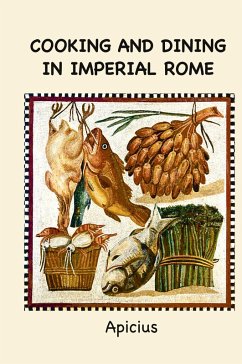Based on the fact that one of the two manuscripts is headed with the words "API CAE," or rather, because a few recipes are attributed to Apicius in the text, the book has been ascribed to an otherwise unknown Caelius Apicius: Patinam Apicianam sic facies (IV, 14). It has alternatively been ascribed to Marcus Gavius Apicius, a Roman gourmet who flourished during Tiberius's rule sometime in the first century CE. Furthermore, numerous Roman chefs from the first century CE could have contributed to the book's composition. Many of the recipes call for silphium, a mineral that vanished in the first century CE, so this supports the older date. According to textual research, however, the culinary historian Bruno Laurioux believes the extant form only dates from the fifth century-that is, the end of the Roman Empire: "The history of De Re Coquinaria indeed belongs to the Middle Ages."
Hinweis: Dieser Artikel kann nur an eine deutsche Lieferadresse ausgeliefert werden.
Hinweis: Dieser Artikel kann nur an eine deutsche Lieferadresse ausgeliefert werden.








